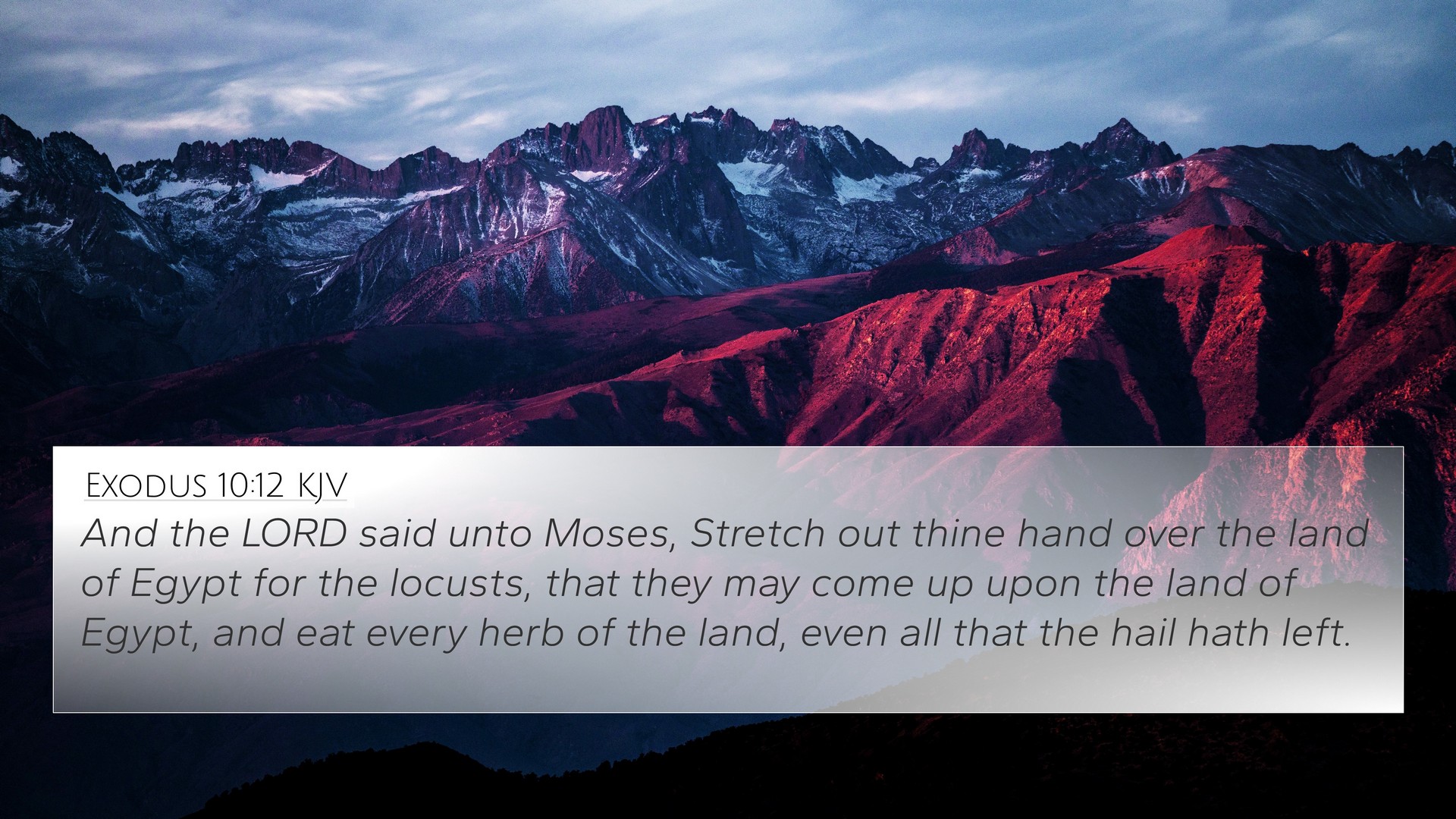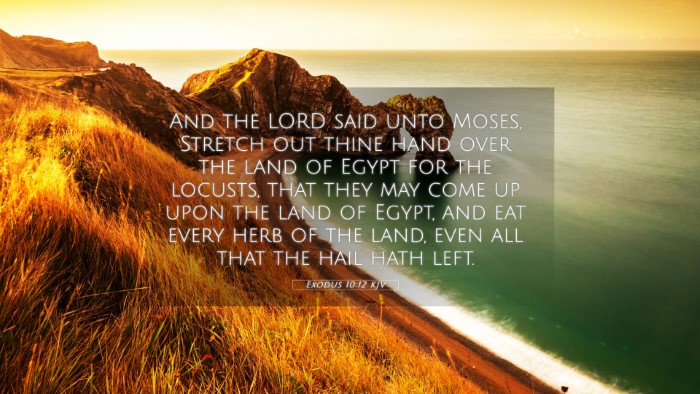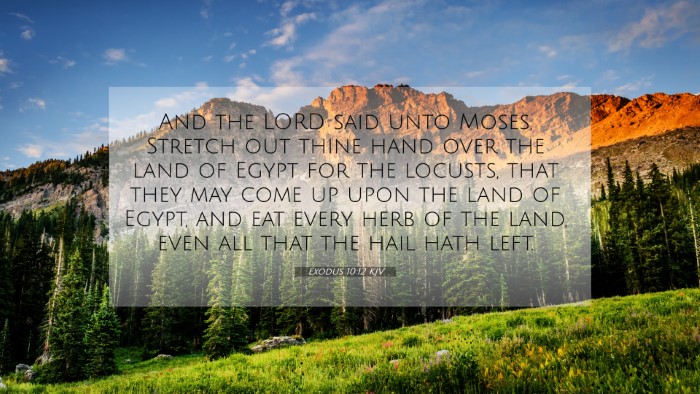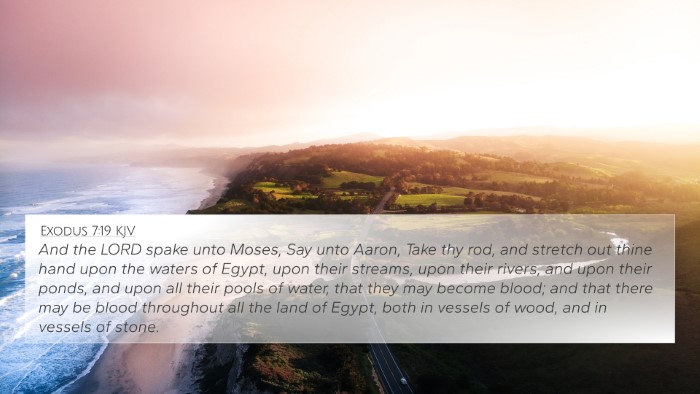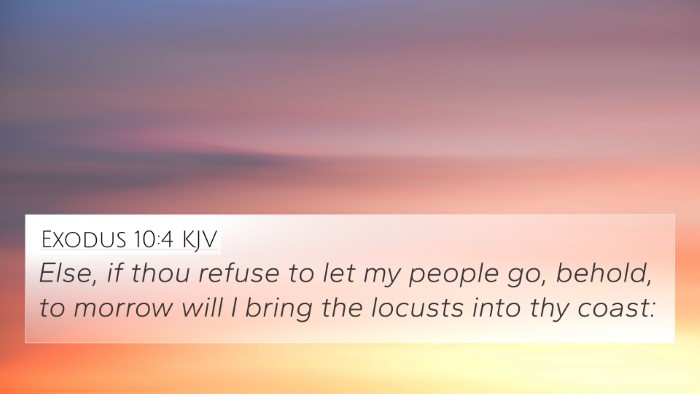Understanding Exodus 10:12
Exodus 10:12 reads: "And the LORD said unto Moses, Stretch out thine hand over the land of Egypt for the locusts, that they may come up upon the land of Egypt, and eat every herb of the land, even all that the hail hath left." This verse is part of the narrative in which God tells Moses to unleash the eighth plague upon Egypt, and it holds deep theological and practical significance.
Contextual Background
To fully appreciate the meaning of Exodus 10:12, it is essential to consider its context within the Book of Exodus.
- This plague is the eighth in a series of ten plagues that God sent upon Egypt to convince Pharaoh to release the Israelites from slavery.
- The locusts were a formidable force, capable of devastating the agricultural economy of Egypt, which relied heavily on crop production.
- The command to stretch out Moses' hand symbolizes divine authority and the power of God working through leaders.
Thematic Insights
Analyzing this verse through a thematic lens reveals several layers of meaning:
- The Power of God: The locusts represent God's power over creation and His ability to control nature.
- Judgment and Mercy: While the locusts serve as a judgment upon Egypt, it highlights God's persistent warning and invitation to repentance.
- Leadership and Obedience: Moses’ role emphasizes the importance of obedience to God's commands in the pursuit of liberation.
Cross-References
This verse connects with several other scripture passages, which enrich our understanding through comparative Bible verse analysis:
- Exodus 10:4-6: The prior verses where God warns Pharaoh of the approaching locusts.
- Exodus 7:17-19: The first plague of the Nile turning to blood illustrates God’s control over Egyptian gods.
- Exodus 9:22-25: The plague of hail, which set the context for the devastation that locusts would finish.
- Psalm 105:34-35: A summary of the plagues as acts of God's power.
- Joel 1:4: Refers to locusts as a judgment from God, emphasizing their destructive nature.
- Matthew 24:7: "For nation will rise against nation, and kingdom against kingdom, and there will be famines and earthquakes in various places," connects to the theme of calamity through locusts.
- Revelation 9:3: Symbolic locusts in apocalyptic literature suggest ongoing biblical themes of judgment.
Exploring Interpretations
Various commentaries provide insight into the multifaceted meanings of Exodus 10:12:
- Matthew Henry: Focuses on God's sovereignty and the symbolic significance of the plagues, serving as a divine warning.
- Albert Barnes: Explains the locusts' role in illustrating God's control over the natural world as part of His judgment.
- Adam Clarke: Highlights how the plagues reveal the futility of relying on earthly powers against divine will.
Application for Today
Exodus 10:12 remains relevant, calling believers to trust in God's authority and responsiveness to cries for deliverance. Just as Israelites witnessed God's power manifested through Moses, modern believers can look for God's intervention in their lives, recognizing His ongoing role as a sovereign ruler over creation.
Conclusion
While this passage may seem solely historical, the themes of divine authority, judgment, and mercy resonate throughout scripture and encourage connections between Bible verses. Understanding how Exodus 10:12 ties to other biblical texts allows for deeper engagement with God's word and affirms the rich tapestry of scripture.
In exploring this verse, one may find that there are many tools for Bible cross-referencing that can aid in study and interpretation, including concordances and thematic guides, deepening one's understanding and appreciation of interconnected biblical narratives.
